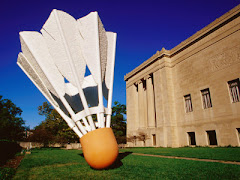
Sunday, August 19, 2007
Saturday, August 18, 2007
imitation is the highest form of flattery
Wednesday, August 15, 2007
Monday, August 13, 2007
Pi$$ Elvis

http://en.wikipedia.org/wiki/Piss_Christ
Graceland.
In the very funny movie Spinal Tap (it ranks an eleven on a scale of one to ten), we find the members of the band staring at the grave of Elvis, having pilgramaged to Graceland seeking inspiration but instead finding the reality of his death and, by implication, their own mortality. After attempting a hilariously lame rendition of Heartbreak Hotel (an attempt they deride as “f-ing barbershop reggae”), they return to their glum silence. Nigel says, “Well, it certainly puts perspective on it, now don’t it?” To which David St. Hubbins replies in a huff, “Too much! Too much f-ing perspective.”
You can say that again.
Graceland. What to say?
Here’s the deal. It’s all about Elvis. And let me remind you of one thing you mustn’t forget about Elvis: He wore a cape. He wore a cape when capes were so last century. He wore a cape when he met President Nixon. Who thinks to himself, I’m meeting the President today—why can’t I find my favorite sequined cape?! Elvis Presley wearing a cape in 1973 would be like Donald Trump going to work today in a huge pumpkin carriage. He could do it, I suppose, but why would he? Why did Elvis wear that cape? To my way of thinking, the two most likely possibilities are: (1) he had a keen sense of ironic detachment and knew that in a democratic society all talk of kingliness is an act of playfulness--a little wink at the audience that everyone involved is on the gig; or (2) because he believed that a cape was somehow fitting for who he was.
I think the correct answer is probably the latter. Because let me tell you this. Any irony at Graceland is altogether unintentional or brought to the place by the tourist. Graceland is the single most earnest spot in the universe. Although everything Elvis did was ridiculously over the top and hilariously gaudy and excessive, Graceland treats his every move as the simple and natural expression of a simple downhome Southern boy who loved his mama and his fans. And one gathers from the displays that Elvis viewed things the same way.
Graceland is billed as an opportunity to get closer to Elvis, to understand his world a little better. I left Graceland confused and bewildered and feeling that David St. Hubbins was right--that it did put a little bit too much f-ing perspective on it all.
Graceland is a shrine to two things: money and simulacrum. Everyone knows about the money end, so I’ll pass that by here. Graceland is virtually nothing but simulacrum piled upon simulacrum upon simulacrum. There are literally thousands of images, maybe tens of thousands of images of Elvis from the gift house (gift complex? Gift Village?) to virtually every room of the house. Of course through his vocal recordings, Elvis’ voice will carry on through generations. But his visual image reigned supreme at Graceland. Like Stalin in the Soviet Union and Saddam Hussein in Iraq, Elvis becomes a god in Graceland through the ubiquity of his image. The Bible says that when two or three of His children are gathered in His name, He will be there. Elvis does God one better at Graceland. Whether alone or with others, one cannot escape the gaze of Elvis’ omnipresent visage. It never ceases to shine down upon you, whether you want it to or not.
At various points in the tour, Elvis returns from the dead through the magic of television and audio recordings to directly address the tourist to explain the significance of this artifact or that stage in his career. We hear his music at multiple points and see film images of his life on one of perhaps a hundred video monitors in the house, sometimes several of which are blaring simultaneously. In time I felt like a prisoner in a labyrinth of funhouse mirrors, except I did not see a multiplicity of distorted and fractured images of myself; instead it was Elvis here, Elvis there, Elvis everywhere.
I visited Monticello a few weeks after visiting Graceland, and Jefferson’s presence filled his home just as Elvis’ presence fills Graceland. But at Monticello one discerns Jefferson’s presence slowly, almost disappointingly subtly, and one comes to feel his presence by recognizing his vision for the place. Jefferson’s life was arguably devoted to ordering and remaking the social universe to reflect the principled order of eternity that informed his own mind. Those principles and ideas suffused everything Jefferson did and the things he could not make to reflect their power he hid away (like his slaves’ headquarters). Radiating ever outward from his mind--to his study to Monticello to the University of Virginia to the United States of America and, through its example, to the entirety of the world—Jefferson’s plans for the human race were ambitious beyond comprehension. Yet despite his ambitions, only a portrait or two of Jefferson grace the walls of Monticello. His life was an attempt to make principles take on flesh and blood.
In contrast, Graceland begins and ends with Elvis himself—think of God before the Creation. Graceland is all Elvis all the time. The point of Elvis was Elvis. The tour takes us through his world and the last stop before one exits his home is a dazzling display of visual stimulation (and simulation?) led by a giant audio-visual screen that overwhelms the viewer into a kind of awed submission. Elvis is made god. To hammer home the point, the audio tells us that Elvis’ light continues to shine and has never shone brighter.
But here’s the problem with the “light shining ever brighter” principle:
Elvis has left the building.
The tour concludes with a visit to his grave. And like the members of Spinal Tap, I found that it was a most depressing stop.
Thoroughly depressing.
In a bizarre and perhaps superficial way, I found that my visit to Graceland helped me understood Spinal Tap a bit better. As is well known, the film’s dialogue was largely improvised, and though the actors were in character when they filmed their Graceland spot, it’s my belief that they were in fact genuinely depressed to see Elvis’ grave. I know that I was bewildered, confused, disoriented, and emotionally disjointed by the entire Graceland visit. However, I did experience clarity when I visited his grave.
Elvis was a human being with human hopes and dreams. For good or for bad, celebrity does not remove the need to release one’s bowels from time to time. Elvis belched and picked his nose and lusted after women and suffered from the occasional nightmare and pretty much experienced the fate of all persons. Cause and effect had as much bearing on him as it does on everyone else. When he ate too much he got fat. When he took drugs his mind began to escape him.
No matter how many capes he wore, and despite every effort to fool the tourist to the contrary, Elvis was not a king. Nor was he an immortal, a god. The thousands of images of Elvis are so many particles of dust that do as much good for him now as my long-lost baby teeth do for me today.
Here’s the too much f-ing perspective part. Elvis’ light is not shining. Not at all. True, his life had a huge impact on his followers, and one can argue that that level of impact entails a kind of eternity. But it is a kind of tepid eternity that ironically does nothing for the one invested by that brand of eternity.
Underneath the dirt of his grave marker is not a torch burning brightly but a pile of bones.
Bones wrapped in a cape.
Wednesday, August 08, 2007
or are they stalactites and stalagmites?
ruby falls

A nearly two-hundred foot waterfall inside a cave. The cave "authorities" (cave people?) illuminate the falls with different colors, thereby creating a surreal effect. The picture has not been doctored. The place is cheesy with an unmistakable tourist trap atmosphere, but the splendor of the falls itself is not completely negated. Cheese is the price you pay for having others do the hard work of digging an elevator shaft four hundred feet into the mountain, securing a half-mile walking path through the cave to the falls, and providing tourist guides. I can't imagine why the persons who did (and do) all that would want to be compensated for their efforts. So: no cheese, no experience. My one complaint is that to herd adequate numbers of people through the cave in a timely fashion each tourist group spends literally no more than five minutes at the falls.
Thursday, August 02, 2007
swish
Subscribe to:
Posts (Atom)


















.jpg)



